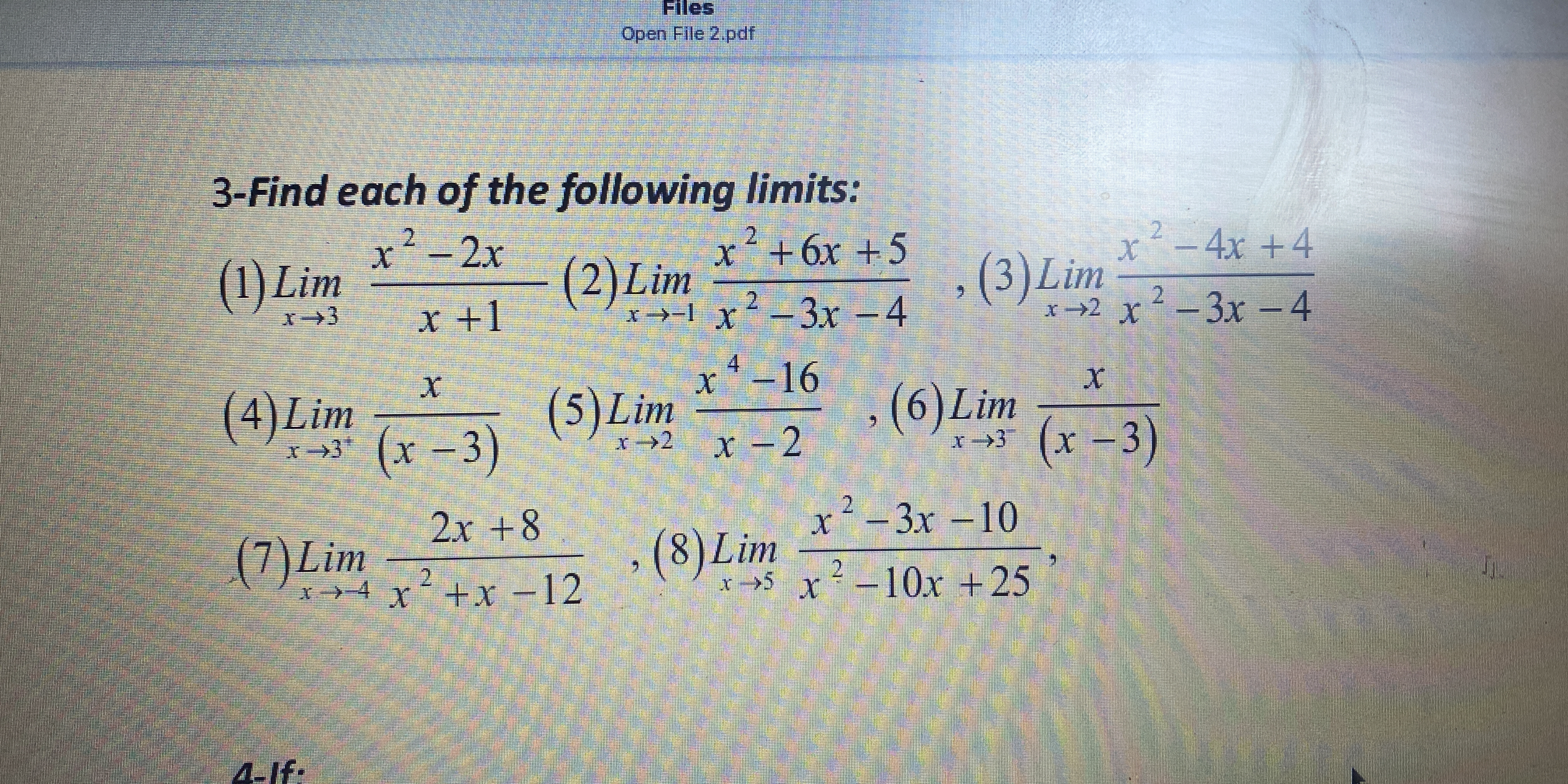Find each of the following limits: (1) Limit as x approaches 3 of (x^2 - 2x) / (x + 1) (2) Limit as x approaches 1 of (x^2 + 6x + 5) / (x^2 - 3x - 4) (3) Limit as x approaches 2 of... Find each of the following limits: (1) Limit as x approaches 3 of (x^2 - 2x) / (x + 1) (2) Limit as x approaches 1 of (x^2 + 6x + 5) / (x^2 - 3x - 4) (3) Limit as x approaches 2 of (x^4 - 16) / (x - 2) (4) Limit as x approaches 3 of x / (x - 3) (5) Limit as x approaches 4 of (2x + 8) / (x^2 + x - 12) (6) Limit as x approaches 3 of (x^2 - 4x + 4) / (x^2 - 3x - 4) (7) Limit as x approaches 2 of x.

Understand the Problem
The question is asking to find the limits of various expressions as the variable x approaches specific values. This involves applying limit laws and techniques to evaluate each limit mathematically.
Answer
1. $\frac{3}{4}$ 2. $-2$ 3. $0$ 4. Does not exist 5. $32$ 6. Does not exist 7. $2$ 8. Does not exist
Answer for screen readers
-
$\frac{3}{4}$
-
$-2$
-
$0$
-
Does not exist
-
$32$
-
Does not exist
-
$2$
-
Does not exist
Steps to Solve
- Limit Calculation for (1)
We need to evaluate the limit: $$ \lim_{x \to 3} \frac{x^2 - 2x}{x + 1} $$ Substituting $x = 3$, we get: $$ \frac{3^2 - 2(3)}{3 + 1} = \frac{9 - 6}{4} = \frac{3}{4} $$
- Limit Calculation for (2)
Next, we evaluate: $$ \lim_{x \to 1} \frac{x^2 + 6x + 5}{x^2 - 3x - 4} $$ Substituting $x = 1$: $$ \frac{1^2 + 6(1) + 5}{1^2 - 3(1) - 4} = \frac{1 + 6 + 5}{1 - 3 - 4} = \frac{12}{-6} = -2 $$
- Limit Calculation for (3)
We evaluate: $$ \lim_{x \to 2} \frac{x^2 - 4x + 4}{x^2 - 3x - 4} $$ Substituting $x = 2$: $$ \frac{2^2 - 4(2) + 4}{2^2 - 3(2) - 4} = \frac{4 - 8 + 4}{4 - 6 - 4} = \frac{0}{-6} = 0 $$
- Limit Calculation for (4)
Now we look at: $$ \lim_{x \to 3} \frac{x}{(x - 3)} $$ Substituting $x = 3$ directly: This forms an indeterminate form, so instead, we evaluate the limit as $x$ approaches 3 from both directions: As $x \to 3$, the expression approaches $+\infty$ or $-\infty$, and thus the limit does not exist.
- Limit Calculation for (5)
Evaluate: $$ \lim_{x \to 2} \frac{x^4 - 16}{x - 2} $$ Factoring the numerator: $$ x^4 - 16 = (x^2 - 4)(x^2 + 4) = (x - 2)(x + 2)(x^2 + 4) $$ Thus we have: $$ \lim_{x \to 2} (x + 2)(x^2 + 4) = (2 + 2)(2^2 + 4) = 4 \cdot 8 = 32 $$
- Limit Calculation for (6)
Evaluate: $$ \lim_{x \to 3} -\frac{x}{(x - 3)} $$ This again is an indeterminate form. As $x \to 3$, this approaches $-\infty$ or $+\infty$, so the limit does not exist.
- Limit Calculation for (7)
Evaluate: $$ \lim_{x \to 4} \frac{2x + 8}{x^2 + x - 12} $$ The denominator factors to: $$ x^2 + x - 12 = (x - 3)(x + 4) $$ Substituting $x = 4$: $$ \frac{2(4) + 8}{(4 - 3)(4 + 4)} = \frac{8 + 8}{1 \cdot 8} = \frac{16}{8} = 2 $$
- Limit Calculation for (8)
Finally, evaluate: $$ \lim_{x \to 5} \frac{-x^2 - 3x - 10}{x^2 - 10x + 25} $$ The denominator factors as: $$ x^2 - 10x + 25 = (x - 5)^2 $$ The numerator evaluates directly: $$ \frac{-5^2 - 3(5) - 10}{0} \quad \text{(indeterminate form)} $$ Thus the limit approaches either $+\infty$ or $-\infty$.
-
$\frac{3}{4}$
-
$-2$
-
$0$
-
Does not exist
-
$32$
-
Does not exist
-
$2$
-
Does not exist
More Information
The limits involve direct substitution and simplification of rational expressions, leading to some indeterminate forms. Proper factoring is crucial for evaluation.
Tips
- Not recognizing indeterminate forms when substituting directly.
- Forgetting to factor polynomials when applicable.
- Mistakes in arithmetic during calculations.
AI-generated content may contain errors. Please verify critical information